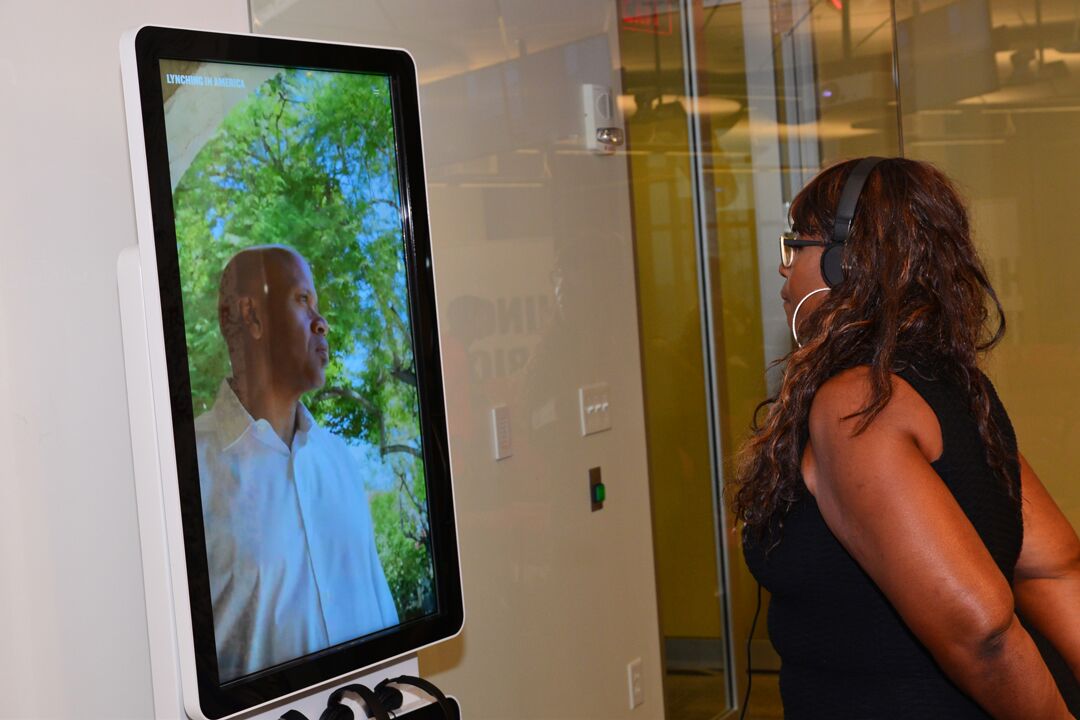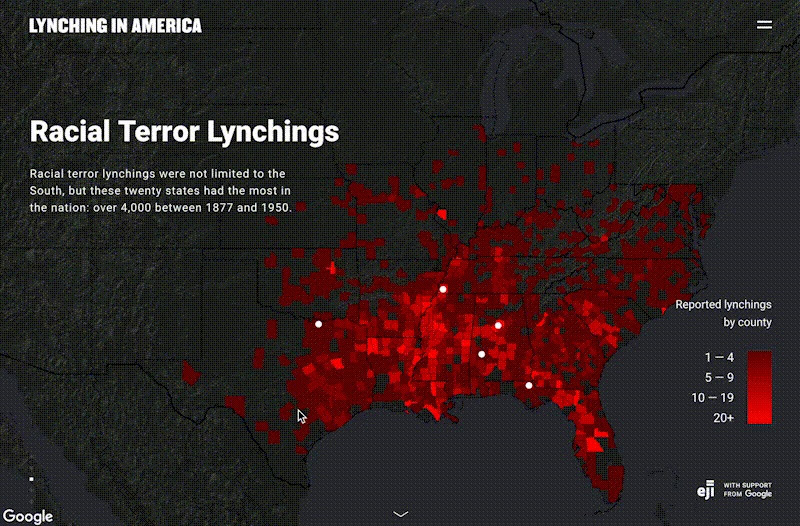Recently, I was invited to attend a private preview of a new digital experience about the legacy of lynching in America. Today, this bold new digital social justice project the Equal Justice Initiative launched. The project made possible with support from Google, is shedding new light on this chapter in American history with Lynching in America: Confronting the Legacy of Racial Terror, an interactive experience that brings their groundbreaking research on this racial violence-and the personal stories behind it-online.

As a Caribbean-American who came to mainland United States and grew up in New York post Martin Luther King and many Civil Rights era events, I am always particularly interested in initiatives which promulgate OUR story not HIStory.
The Equal Justice Initiative is a nonprofit challenging racial injustice both in and out of the courtroom. The organization’s founder, Bryan Stevenson, believes that we cannot truly move forward as a nation until we confront this dark chapter from our past. During the Atlanta event, Mr. Stevenson talked about how America’s court system
“doesn’t value the victimization of people of color They don’t see inequality and injustice that is racialized. I think that has to do with our practice of minimizing and denying what racial inequality has done to us.” — Bryan Stevenson, founder and Executive Director, EJI
The discussion was thought-provoking and at times the visuals and videos were difficult to digest. It is this difficulty which I believe precludes this country from having open discourse about its shameful history and paying homage to the lives lost during slavery and post-slavery when lynching became the new slavery.
Google’s mission statement is universal access to information and knowledge for everyone. What’s important about EJI’s Lynching in America project is that they are giving everyone access to untold stories of our racial history and helping people develop a deeper understanding for how we have gotten to where we are in this country. — Justin Steele, Principal, Google.org
Based on EJI’s original publication of the same name, Lynching in America: Confronting the Legacy of Racial Terror reveals both the scope of lynchings of African Americans between 1877 and 1950 and the profound way in which this era continues to shape our nation,particularly in our criminal justice system. Racial disparities continue to burden people of color; the criminal justice system is infected with racial bias; and a presumption of dangerousness and guilt has led to mass incarceration, excessive punishment, and police violence against people of color. If current trends continue, one of every three black boys born in America today will be imprisoned.
The Lynching in America site brings together EJI’s in-depth research and data with the stories of lynching victims, as told by their descendants. Through six audio stories, and a short documentary, “Uprooted”, you both hear and feel the impact of this dark time in history on generations of families. Uprooted tells the story of Thomas Miles Sr. who was one of more than 4,000 African Americans lynched in the U.S. between 1877 and 1950. Recently, the Dedman/Myles family returned to the South 100 years after Thomas Miles Sr. was lynched there for allegedly passing a note to a white woman.
You can also explore an interactive map that includes incidents of racial terror lynchings, as well as in-depth profiles of the stories behind these acts of violence.

Please take the time to immerse yourself in the stories, visuals and information found at the newly launched website LynchingInAmerica.eji.org
Google has been able to take what we know about lynching, and what we have heard from the families, and what we have seen in the spaces and the communities where these acts of terror took place, and make that knowledge accessible to a lot more people. To create a platform for hearing and understanding and seeing this world that we’ve lived through. — Bryan Stevenson, founder and Executive Director, EJI
About the Lynching in America Project
In 2015, Equal Justice Initiative received a $1 million grant from Google.org to help fund the From Enslavement to Mass Incarceration Museum, as well as its Memorial to Peace and Justice. After the grant was made, EJI and Google.org looked for further ways to work together. EJI’s recently published report, Lynching in America: Confronting the Legacy of Racial Terror (in the form of an 80-page publication), seemed like an opportunity to leverage Google’s expertise — organizing information and making it more universally accessible — in the name of amplifying Equal Justice Initiative’s message. Coinciding with the launch of this project on 6/13, Google.org is donating another $1 million to the Equal Justice Initiative to support their national memorial to lynching victims in Montgomery, Alabama. Opening in 2018, the memorial makes this history an undeniable part of the physical landscape, ushering the past into the present day.
Google’s mission statement is universal access to information and knowledge for everyone. What’s important about EJI’s Lynching in America project is that they are giving everyone access to untold stories of our racial history and helping people develop a deeper understanding for how we have gotten to where we are in this country. — Justin Steele, Principal, Google.org
Kudos to Google for not only being a part of this dialog but putting their money where their mouth is.
































